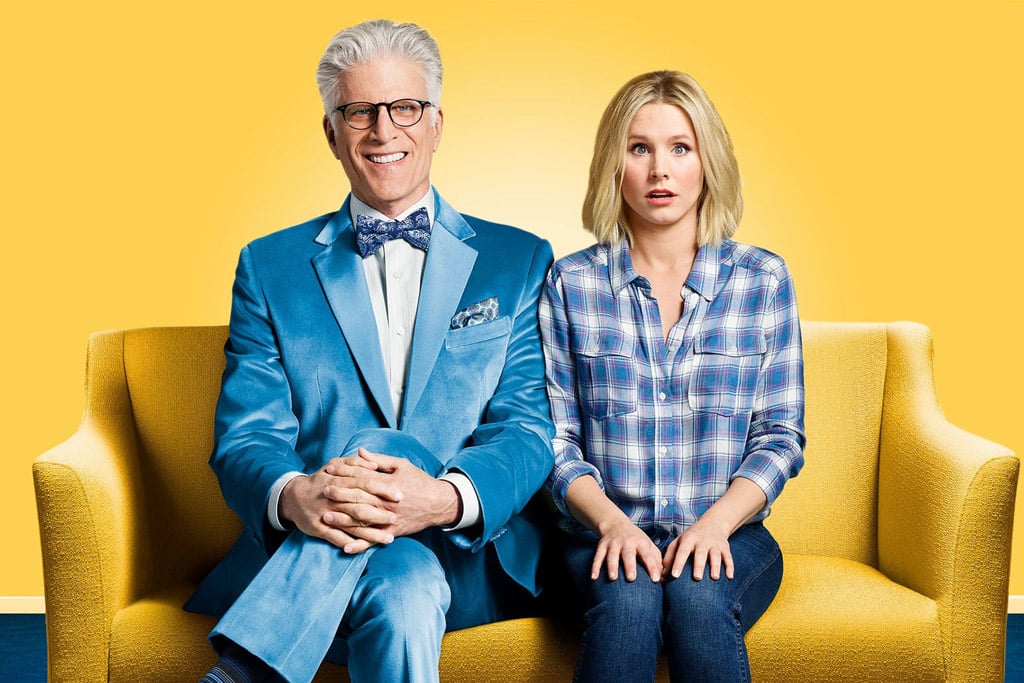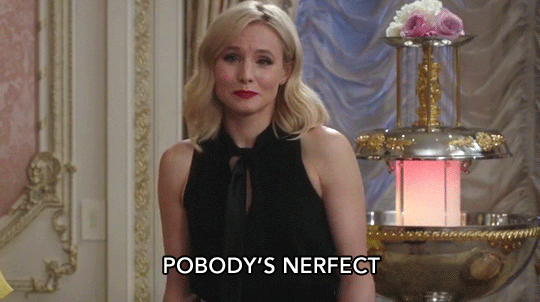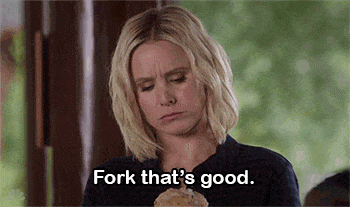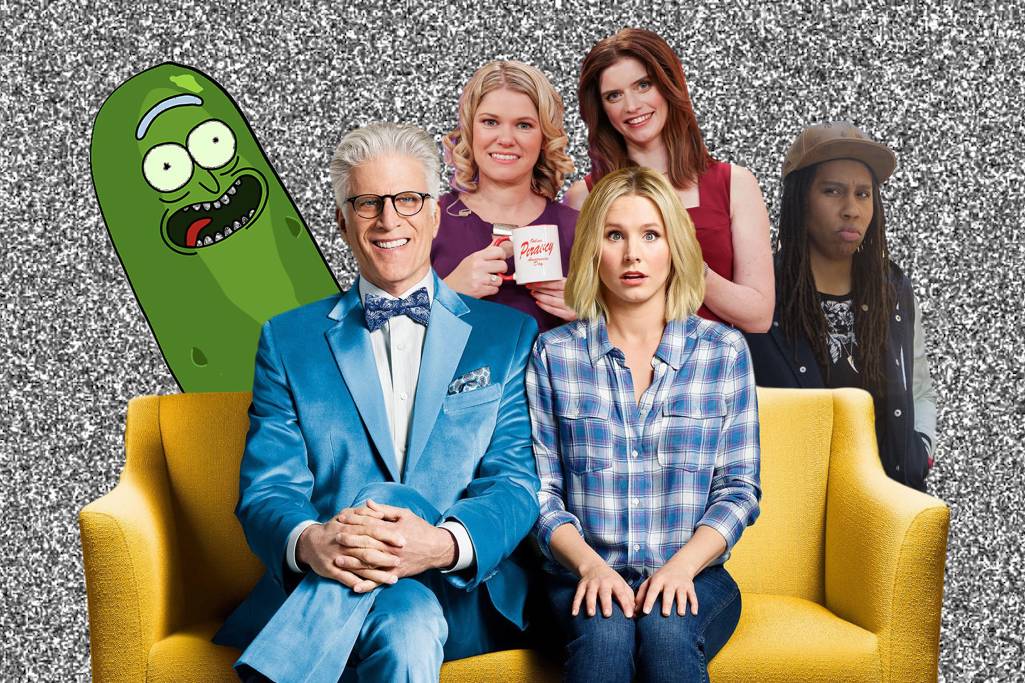Why The Massive Twist In ‘The Good Place’ Makes It The Perfect Show For Our Times
'The Good Place' is the absurd nonsense-show that 2018 forkin' needs.

This article discusses the end of season one of The Good Place — spoilers ahead!
—
The season one finale of The Good Place featured a twist so iconic that it might be one of the greatest moments ever on television: the revelation that the “Good Place” was actually a very bad place in disguise, and that our characters hadn’t been rewarded with heaven, but were actually being tortured in hell. Watching Ted Danson’s face crinkle from gormless mask to malevolent, chuckling visage when he broke the news was not only genuinely shocking and hilarious, but also a defining moment for the show.
In a single move, creator Mike Schur (also known for The Office, Parks and Rec and Brooklyn 99) re-contextualised what the entire show was actually trying to achieve, somehow moving from a high concept comedic meditation on the afterlife into an unexpectedly pertinent allegory. It’s frankly bizarre that such an absurdly premised show has managed to transform itself into a strangely apt mirror for our society.
But it has, because in 2018, we too are just a bunch of bozos who have found ourselves stranded in The Bad Place.
Folks, We’re All In The Bad Place
It’s tempting to always consider the time we live in as the worst in human history, but there’s a certain kind of generational narcissism to the idea. History is pretty chock-full of badness. But, regardless, a lot of shitty stuff is going on at the moment, especially for certain marginalised and at-risk groups in our society.
If you objectively look at the world — burning from climate change, suffering from a megalomaniacal reality TV star in the highest office, the rise of Neo-Nazism — it’s easy to consider that we might also be in a very bad place right now. Many of us have had the rug pulled out from underneath us, and the comfortable place we’ve been in is suddenly strange and uncomfortable.
But the question that The Good Place poses is not so much why or how that happened, but how we keep on being human in such circumstances. What are our ethical responsibilities when the world is a pretty bad place?
There are several big movements dominating our world right now, which shows us that our society is thinking deeply around notions of culpability and responsibility, and that perhaps we need to think outside ourselves. It’s also interesting, that like in The Good Place, these ethical movements are coming from outside a place of religion or traditional political movements, and are more personal, more grassroots.
To sound like an asshole, the current preoccupation with being “woke” is, in essence, sorting out who and what we owe an ethical responsibility towards.
Being A Good Person When Everything Is On Fire
Big television twists are not a new concept, but they’re rarely so universe-changing so early on in the life of the show.
When compared to famous, universe shaking twists like the uninspiring end of Lost (which The Good Place is apparently inspired by), or Felicity‘s magical roommate sending her back in time, or Gossip Girl’s bizarre unmasking as the yeasty Dan Humphries, it’s easy to see that television twists are usually series endings, often to the detriment of the plot we’ve enjoyed all along.
However, The Good Place’s extremely good twist is a rare example of surprise plot shift that not only adds depth to the original story, but also clarifies and affirms what the show is meant to be about. The twist walks us away from simply a show with a wacky premise and guides us towards the ethical goal that The Good Place is trying to achieve – and in a way, it’s trying to achieve a lot.
TV, and to a much wankier extent, art, doesn’t actually need to have a moral point — it can just be entertainment, it can just be fun and funny. But The Good Place is an example of a show that’s decided to do both.
I don’t feel self-conscious about dropping some literary theory into this article, because you can just imagine I’m doing my best Chidi impression: French philospher Jean-Paul Sartre had this idea of Littérature engagée, or a literature of commitment, which was basically the idea that art has a responsibility towards society to always better it.
But imho, this is the wrong idea — art doesn’t need to change society, but usually it will end up reflecting an aspect of society, because the best kinds of art are ones that we see ourselves in. The Good Place is a great example of this, because it doesn’t engage with both society and ethics to push a particular moral code — it’s not that kind of afterlife.
Instead, in The Good Place we watch all our protagonists struggle with the concept of being decent people. How do we prioritise being good people/ falling in love/ tackling big ethical problems, when everything is on fire? How do we make sure we aren’t simply surviving, but actually being the best person we can be, or at least a decent one? The Good Place is a deeply human show, despite the quirk of its premise.

The Sartre drop in this article is actually even more pertinent than it sounds, because we can be fairly sure that The Good Place is Mike Schur’s response to the famously insufferable philosopher.
One of Sartre’s most famous works is his play ‘No Exit’, in which three people find themselves in a mysterious waiting room, which is meant to represent the afterlife, and are punished by being trapped there for eternity. Sound familiar? The play is the source of Sartre’s most well-known and flagrantly misused quote “Hell is other people”, which Schur seems to have taken quite literally for the premise of his own show. If we don’t torture each other in hell, ethically what do we do instead?
Even though I doubt very strongly that The Good Place was invented by Mike Schur to specifically be a comment on our society, the fact that the show deals so carefully and cleverly with the ethical health of its characters means that it can’t help but become that reflection. In an interview with Vulture, Schur said that he didn’t create the show as a response to specific political events like the rise of Trump, and that he instead wanted to explore what makes a person good. But he also did say this:
“The only other thing I’d say is that it was very interesting to be writing a show that’s explicitly about ethics when the president of the United States is under a nearly constant ethics investigation. It is interesting to see that play out, even though nothing that we’re talking about is what they’re talking about. It’s like we’re living in these weird parallel universes that are running alongside each other.”
Our Best Selves
Within the show, season one revolves around the concept Eleanor being taught how to be a good person by an actual moral philosophy professor. But when season two builds on that idea and it becomes four flawed humans teaching a demon enough ethics to become an ‘honorary human’, we see that this isn’t so much an academic enterprise as a deeply relevant, day-to-day struggle.
The Good Place dumps some fairly ordinary humans in hell, and allows us to watch them struggle — not just to survive the machinations of their demon overlords, but to actually be the best people they can be under the circumstances. We get to see what could be lofty, unapproachable ethical concepts boiled down to actual human struggles, as perhaps best evidenced by the episode ‘The Trolley Problem’ in which the famous philosophical conundrum of the same name is actually lived by Chidi, resulting in blood and despair.
In the episode ‘Best Self’, we see each of the characters trying to make themselves “good” enough to ascend to heaven on a magical golden balloon, which ends up being a massive fake, leaving the question of why we try to be good people if there’s no real reward and everything has gone to shit around us. It’s a gorgeous comedy about people who try, and it’s why the show resonates with us — because sometimes it feels like we’re all goddamn trying our best while being tortured by Ted Danson and his shit-eating grin.
Sometimes we have to create our own meaning in existence, and keep working regardless of the terrible things happening around us. It’s not about being the perfect person that’s suitable for heaven, but simply bring the best person you can be in hell. We have to create our own good place.
As Michael says, as they catch a train out of the sham Good Place:
“In a way, the Good Place was inside the Bad Place … all along?”

—
The Good Place season 2 is released weekly on Netflix.
—
Patrick Lenton is a staff writer at Junkee, writer and author. He Tweets @patricklenton.
